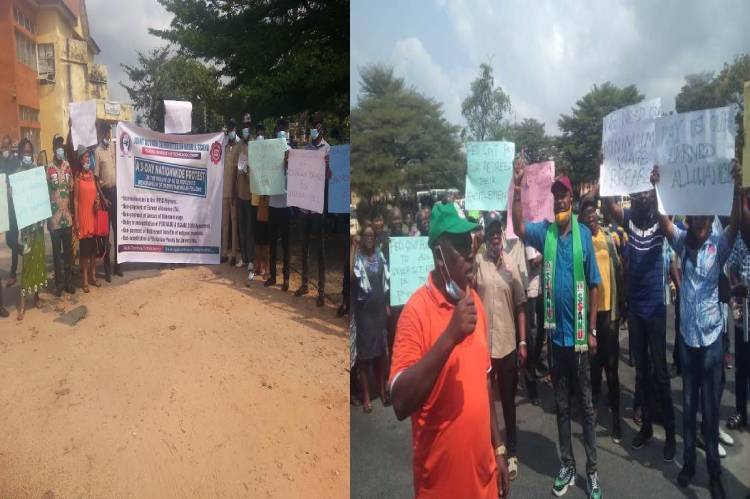Education
Varsity workers declare indefinite strike from Feb 5

Barely one month after university lecturers called off a nine-month strike, another industrial action has been declared by the Non-Academic Staff of Educational and Associated Institutions (NASU) and the Senior Staff Association of Nigerian Universities (SSANU) with effect from February 5.
The two unions coming under the Joint Action Committee (JAC) have given the government a 14-day ultimatum to meet their demands bordering on welfare package and changes in the university system or risk an “indefinite, comprehensive and total strike”.
The leadership of the unions made the announcement at a press conference in Abuja on Friday, stressing that if the government failed to address all the issues, the strike would commence from the midnight of February 5.
General Secretary of NASU, Peters Adeyemi, who spoke on behalf of JAC leadership, said 90 per cent of NASU members in all its branches across the country were in support of the strike.
He also said 83 per cent of SSANU members had expressed support for the strike; 11 per cent were against strike, adding that six per cent were indifferent.
Adeyemi said, “It is in line with the resolution of our members nationwide that the leadership of the Joint Action Committee of NASU and SSANU hereby resolves as follows: That members of NASU and SSANU shall embark on an indefinite, comprehensive and total strike with effect from midnight of Friday 5th February, 2021.
“That two weeks’ notice effective from today, Friday 22nd January, 2021, is hereby given to government and relevant stakeholders of this development.”
He said JAC of NASU and SSANU had signed an understanding with the Federal Government on Tuesday 20 October, last year on all the contentious issues affecting the university system and the welfare of their members.
The issues, according to him, are inconsistencies in IPPIS payment; non-payment of earned allowances; non- payment of arrears of national minimum wage; delay in renegotiation of FGN/NASU and SSANU 2009 agreements.
Other are non-payment of retirement benefits of former members; teaching staff usurping headship of non-teaching units in violation of conditions of service and establishment procedures; neglect and poor funding of state universities; and non-constitution of visitation panels for universities.
Adeyemi said, “Having painstakingly taken you through all the issues as agreed upon in the October 2020 memorandum of understanding with government, it should be easy for you to deduce that out of the seven items upon which agreements were reached, only one item – constitution of visitation panels has been implemented. Even that item was not implemented within the timeline as agreed upon and is still only partially implemented.
“It was against this background that the national protests were embarked on the January 12 to 14, 2021, with a view to drawing the attention of necessary stakeholders to the issues and seeking redress as appropriate. Sadly, till date, no response has been got and it would seem that the government played deaf to our protests and lamentations.”
He added: “As stated earlier, the Joint Action Committee of NASU and SSANU had been very circumspect about embarking on strike action. It has never been our style to undertake strike actions at the drop of a hat. Sadly, it would appear that our non-belligerent modes of engagement have been taken for weakness and our belief in civil engagement and dialogue has been taken for granted.
“It is against this backdrop and in a democratic spirit that the leadership of the Joint Action Committee (JAC) of NASU and SSANU threw back the decision after the three- day protests to the various memberships across branches on the way forward and the resolutions have been overwhelming.”
Education
FG says colleges of education will begin awarding degrees in September

FG says colleges of education will begin awarding degrees in September
Minister of Education, Tunji Alausa, says a dual mandate allowing colleges of education (COEs) to award both bachelor’s degrees and the National Certificate in Education (NCE) is for implementation this September.
In 2023, the mandate was signed into law, having undergone ideation with numerous committees recommending its adoption.
It was to take effect from the 2024/2025 academic session (starting September 2024), where only federal COEs aged at least 10 years were to pilot the programme.
Alausa spoke in Abuja during a follow-up meeting on resolutions from the last biannual stakeholders meeting.
He said the implementation of the dual mandate will now begin in September 2025.
The education minister said it would boost enrolment in COEs and eliminate the need to convert COEs to universities.
Alausa said reforms within COEs are important for adapting to modern demands and technological advancements.
He urged educators to integrate technology, critical thinking, and computational skills into their curricula.
“We once had a strong educational system, and that’s what we are working hard to restore. All hands are on deck to achieve this,” he said.
“We must tackle the high number of out-of-school children and reduce learning poverty across the country. As teachers, you are at the centre of driving this change, and you must also challenge yourselves.
“The way we taught 30 or 50 years ago is no longer relevant. Education and teaching methods are evolving. You must start thinking about how to use technology in the classroom.”
Alausa stressed the need for educators to harness educational technology and artificial intelligence to improve teaching and learning outcomes.
Addressing declining enrolment in colleges of education, he urged administrators and staff to support the ongoing reforms, warning that the survival of their institutions depends on their ability to adapt.
“With this dual mandate, there is no need for conversion to university status. You should be the ones pushing for implementation, not the other way around. It’s a matter of your survival,” he said.
“The government has secured the future of colleges of education. It is now up to you to sustain them. Failure to embrace this mandate could lead to extinction.
“With this reform, there’s no justification for any college of education to seek university status.”
Education
Kano governor gives secondary students 10,000 free JAMB forms

Kano governor gives secondary students 10,000 free JAMB forms
The Governor of Kano State, Alhaji Abba Kabir Yusuf, has inaugurated the distribution of 10,000 free JAMB forms to Kano secondary school students.
During the flag-off of the distribution, the Governor, who was represented by the state’s Commissioner of Education, Ali Haruna Makoda, also used the opportunity to inaugurate the training of the 10,000 beneficiaries on the use of computer-based tests at various designated centers across Kano State.
On his part, the Governor’s Special Adviser on Education, Alhaji Tajuddin Gambo, said the Governor has promised to provide transport for the beneficiaries throughout the training session and urged them to ensure they pass the examination.
He said the government is willing to select the best schools for the beneficiaries if they pass the examinations.
One of the beneficiaries of the 10,000 free JAMB forms, Fatima Mukhtar Umar, expressed gratitude to Governor Abba Kabir Yusuf for issuing the free JAMB forms and promised not to disappoint.
READ ALSO:
- N10m raised to relocate boy who faced Peter Obi convoy — Lawyer
- Delta Governor’s aide, Shimite, dies on Easter Monday
- 4 killed, 8 injured in Gombe Easter Monday road accident
In a statement by Governor Abba Kabir Yusuf’s Special Adviser on Information, Ibrahim Adam, it was noted that the Governor used the opportunity to elaborate on the feats achieved by his government in developing the education sector in the last 22 months. These include the re-introduction of foreign and domestic scholarships, re-opening of 21 skills acquisition institutes, general renovation of primary and secondary schools, construction of new classrooms, provision of classroom furniture and writing materials, and the distribution of free uniforms to primary school pupils.
Other achievements, according to the Governor’s Special Adviser on Information, Ibrahim Adam, include the reduction of 50% of registration fees in state-owned tertiary institutions, cash conditional transfers to support girl-child education, and the settlement of registration fees for NECO, NABTEB, and NBAIS, to mention but a few.
Ibrahim Adam said Governor Abba Kabir Yusuf urged all the beneficiary students to make the best use of the opportunity and strive for excellence in their academic pursuits, saying that the future belongs to those who work tirelessly to turn dreams into realities.
Kano governor gives secondary students 10,000 free JAMB forms
Education
WAEC unveils portal for past WASSCE questions

WAEC unveils portal for past WASSCE questions
The West African Examinations Council, WAEC, has announced four significant innovations for the upcoming 2025 West African Senior School Certificate Examination, WASSCE. One of such is a portal to access past questions.
The notable change introduces a unique question set for each candidate, alongside a transition to a computer-based examination format.
Dr. Amos Dangut, the Nigeria National Office Head of WAEC, expressed enthusiasm about these innovations, stating, “In our continuous effort to enhance the educational experience and improve student outcomes, WAEC is excited to announce the introduction of an innovative e-learning portal and an e-study portal, along with the availability of past examination questions.”
One of the key innovations includes the addition of past questions, which will now be accessible online.
This resource is designed to help candidates prepare effectively by familiarizing them with the exam format and question styles.
“By practicing with these questions, candidates can identify their strengths and areas that require improvement, leading to better performance in the examination,” Dr. Dangut explained.
The E-Learning Portal is another significant development. This platform will offer a comprehensive suite of educational materials, including video tutorials and interactive lessons tailored to the WASSCE curriculum. “By leveraging technology, we aim to create an engaging learning environment that encourages self-paced study, ultimately enhancing the academic readiness of our candidates,” he added.
READ ALSO:
- CBEX: SEC can’t recover lost N1.3trn funds for victims, says DG
- [Updated] 9 rescued as three-storey building collapses in Lagos
- Multiple casualties as truck rams into vehicles on Abuja’s Karu Bridge
Additionally, the newly introduced E-Study Portal will serve as a centralized hub for essential study resources, including study guides and revision tips. It will also facilitate collaboration among students through discussion forums.
“This will allow them to engage with peers and educators for a more enriched learning experience,” Dr. Dangut noted.
-

 metro2 days ago
metro2 days agoRivers: Tinubu meets with Fubara, may lift his suspension
-

 metro2 days ago
metro2 days agoBring your children to compete with mine, MC Oluomo challenges those mocking his spoken English
-

 News2 days ago
News2 days agoTinubu returns to Nigeria after France, UK trip
-

 metro1 day ago
metro1 day agoI’m not in supremacy battle with Ooni, says new Alaafin
-

 metro3 days ago
metro3 days agoAnsar-Ud-Deen Society of Nigeria elects new leaders, Tinubu praises educational contributions
-

 Business2 days ago
Business2 days agoMarketers count losses as NNPC slashes petrol price
-

 metro3 days ago
metro3 days agoReno Omokri defends Tinubu’s appointments, blasts president’s critics
-

 metro3 days ago
metro3 days agoN10m raised to relocate boy who faced Peter Obi convoy — Lawyer














You must be logged in to post a comment Login